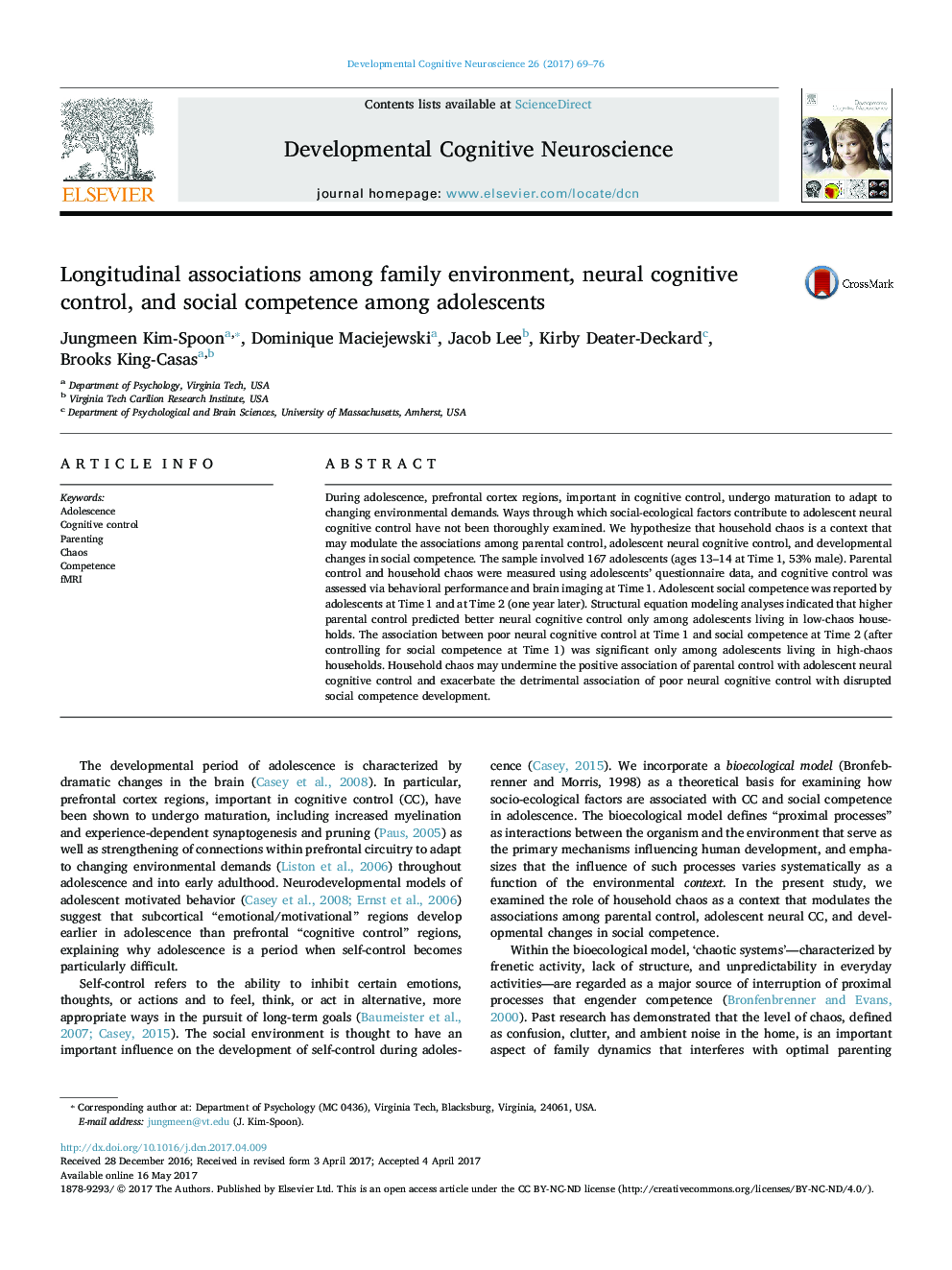| کد مقاله | کد نشریه | سال انتشار | مقاله انگلیسی | نسخه تمام متن |
|---|---|---|---|---|
| 5735811 | 1613097 | 2017 | 8 صفحه PDF | دانلود رایگان |
عنوان انگلیسی مقاله ISI
Longitudinal associations among family environment, neural cognitive control, and social competence among adolescents
ترجمه فارسی عنوان
پیوندهای طولی در محیط خانواده، کنترل شناختی عصبی و شایستگی اجتماعی در نوجوانان
دانلود مقاله + سفارش ترجمه
دانلود مقاله ISI انگلیسی
رایگان برای ایرانیان
کلمات کلیدی
ترجمه چکیده
در طی نوجوانی، مناطق قشر پیش فرنتال، که در کنترل شناختی مهم هستند، بلوغ می شوند تا با تغییر نیازهای محیطی سازگار شوند. راه هایی که از طریق آن عوامل اجتماعی-محیطی به کنترل عاطفی نوجوانان کمک می کنند، مورد بررسی قرار نگرفته اند. ما فرض می کنیم که هرج و مرج خانوار یک زمینه است که می تواند ارتباطات در کنترل والدین، کنترل عاطفی نوجوانان و تغییرات توسعه در صلاحیت اجتماعی را تعدیل کند. نمونه شامل 167 نوجوان (13-14 ساله در زمان 1، 53٪ مرد). کنترل والدین و هرج و مرج خانوار با استفاده از داده های پرسشنامه نوجوانان و کنترل شناختی از طریق عملکرد رفتاری و تصویربرداری مغز در زمان 1. ارزیابی عملکرد نوجوانان در زمان 1 و در زمان 2 (یک سال بعد) گزارش شد. تجزیه و تحلیل مدل سازی معادلات ساختاری نشان داد که کنترل والدین بالاتر، کنترل بهتر شناخت عصبی را تنها در میان نوجوانان زندگی می کنند که در خانواده های کم چاوش هستند. ارتباط بین کنترل شناختی عصبی فقیر در زمان 1 و صلاحیت اجتماعی در زمان 2 (پس از کنترل صلاحیت اجتماعی در زمان 1) تنها در میان نوجوانان زندگی می کند که در خانواده های پرخطر وجود دارد. هرج و مرج خانوار ممکن است ارتباط مثبت کنترل والدین با کنترل شناختی عصبی نوجوان را تضعیف کند و همبستگی مخربی کنترل ضعف عصبی ضعیف با توسعه مهارت های اجتماعی را مختل کند.
موضوعات مرتبط
علوم زیستی و بیوفناوری
علم عصب شناسی
علوم اعصاب رفتاری
چکیده انگلیسی
During adolescence, prefrontal cortex regions, important in cognitive control, undergo maturation to adapt to changing environmental demands. Ways through which social-ecological factors contribute to adolescent neural cognitive control have not been thoroughly examined. We hypothesize that household chaos is a context that may modulate the associations among parental control, adolescent neural cognitive control, and developmental changes in social competence. The sample involved 167 adolescents (ages 13-14 at Time 1, 53% male). Parental control and household chaos were measured using adolescents' questionnaire data, and cognitive control was assessed via behavioral performance and brain imaging at Time 1. Adolescent social competence was reported by adolescents at Time 1 and at Time 2 (one year later). Structural equation modeling analyses indicated that higher parental control predicted better neural cognitive control only among adolescents living in low-chaos households. The association between poor neural cognitive control at Time 1 and social competence at Time 2 (after controlling for social competence at Time 1) was significant only among adolescents living in high-chaos households. Household chaos may undermine the positive association of parental control with adolescent neural cognitive control and exacerbate the detrimental association of poor neural cognitive control with disrupted social competence development.
ناشر
Database: Elsevier - ScienceDirect (ساینس دایرکت)
Journal: Developmental Cognitive Neuroscience - Volume 26, August 2017, Pages 69-76
Journal: Developmental Cognitive Neuroscience - Volume 26, August 2017, Pages 69-76
نویسندگان
Jungmeen Kim-Spoon, Dominique Maciejewski, Jacob Lee, Kirby Deater-Deckard, Brooks King-Casas,
